| Terry Jones' Medieval Lives | |
|---|---|
| Genre | Documentary |
| Written by | Terry Jones |
| Directed by | Nigel Miller |
| Presented by | Terry Jones |
| Composer | David Mitcham |
| Country of origin | United Kingdom |
| Original language | English |
| No. of seasons | 1 |
| No. of episodes | 8 |
| Production | |
| Producers |
|
| Release | |
| Original network | BBC Two |
| Original release | 3 January – 24 January 2004 |
| Related | |
| Terry Jones' Barbarians | |
Terry Jones' Medieval Lives is a 2004 television documentary series produced for the BBC. Written and hosted by Terry Jones, each half-hour episode examines a particular medieval personality, with the intent of separating myth from reality.
The episode The Peasant was nominated for Outstanding Writing for Nonfiction Programming at the 2004 Emmy Awards. Dr. Faye Getz acted as consultant for the series.
Being a comedian as well as an historian, Jones takes an established belief, turns that around, and presents proof for his assertion. For example, peasants did not live in complete squalor and actually owned property. Also class divisions were not as severe as people think; there are cases of low-born people who rise to quite high positions.
In the episode on kings, he says, "History isn't necessarily what happened. It's often what people want us to think happened." He uses the following examples:
Jones explained his motivation for making this series in the article in The Observer : "The main reason I wanted to make Medieval Lives was to get my own back on the Renaissance. It's not that the Renaissance has ever done me any harm personally, you understand. It's just that I'm sick of the way people's eyes light up when they start talking about the Renaissance. I'm sick of the way art critics tend to say: 'Aaaah! The Renaissance!' with that deeply self-satisfied air of someone who is at last getting down to the 'Real Thing'. And I'm sick to death of that ridiculous assumption that before the Renaissance human beings had no sense of individuality."
The eight episodes were as follows:

Sir Michael Edward Palin is an English actor, comedian, writer, and television presenter. He was a member of the Monty Python comedy group. He received the BAFTA Fellowship in 2013 and was knighted by Queen Elizabeth II in 2019.
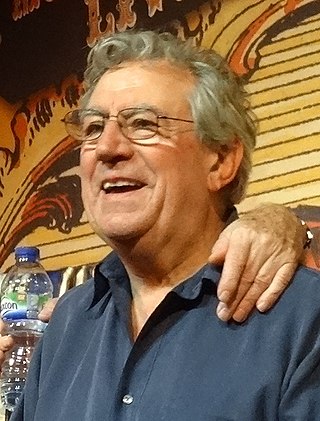
Terence Graham Parry Jones was a Welsh comedian, director, historian, actor, writer and member of the Monty Python comedy troupe.

I'm Sorry I Haven't a Clue is a BBC radio comedy panel game. Billed as "the antidote to panel games", it consists of two teams of two comedians being given "silly things to do" by a chairman. The show was launched in April 1972 as a parody of radio and TV panel games, and has been broadcast since on BBC Radio 4 and the BBC World Service, with repeats aired on BBC Radio 4 Extra and, in the 1980s and 1990s, on BBC Radio 2. The 50th series was broadcast in November and December 2007.
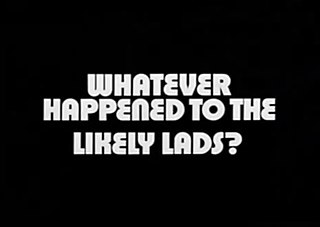
Whatever Happened to the Likely Lads? is a British sitcom which was broadcast on BBC1 between 9 January 1973 and 9 April 1974. It was the colour sequel to the mid-1960s hit The Likely Lads. It was created and written, as was its predecessor, by Dick Clement and Ian La Frenais. There were 26 television episodes over two series, and a subsequent 45-minute Christmas special was aired on 24 December 1974.
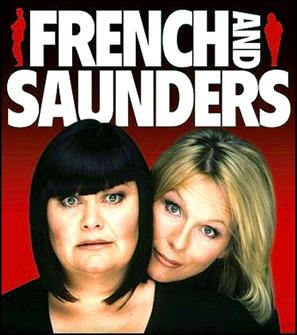
French and Saunders is a British sketch comedy television series written by and starring comedy duo and namesake Dawn French and Jennifer Saunders that originally broadcast on BBC2 from 1987 to 1993, and later on BBC One until 2017. It is also the name by which the performers are known on the occasions when they appear elsewhere as a double act. The show was given one of the highest budgets in BBC history to create detailed spoofs and satires of popular culture, movies, celebrities, and art. French and Saunders continued to film holiday specials for the BBC, and both have been individually successful starring in other shows.
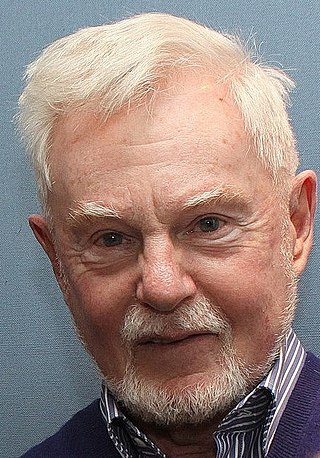
Sir Derek George Jacobi is an English actor. Jacobi is known for his work at the Royal National Theatre and for his film and television roles. He has received numerous accolades including a BAFTA Award, two Olivier Awards, two Primetime Emmy Awards, two Screen Actors Guild Awards, and a Tony Award. He was given a knighthood for his services to theatre by Queen Elizabeth II in 1994.

Maid Marian and her Merry Men is a British children's television series created and written by Tony Robinson and directed by David Bell. It began in 1989 on BBC1 and ran for four series, with the last episode shown in 1994. The show was a partially musical comedy retelling of the legend of Robin Hood, placing Maid Marian in the role of leader of the Merry Men, and reducing Robin to an incompetent ex-tailor.

The BBC Television Shakespeare is a series of British television adaptations of the plays of William Shakespeare, created by Cedric Messina and broadcast by BBC Television. Transmitted in the UK from 3 December 1978 to 27 April 1985, it spanned seven series and thirty-seven episodes.

The Ballad of Halo Jones is a science fiction comic strip written by Alan Moore and drawn by Ian Gibson, with lettering by Steve Potter and Richard Starkings.
Time Gentlemen Please is a British sitcom primarily written by Richard Herring and Al Murray and broadcast on Sky One from 2000 to 2002.

The Black Adder is the first series of the BBC sitcom Blackadder, written by Richard Curtis and Rowan Atkinson, directed by Martin Shardlow and produced by John Lloyd. The series was originally aired on BBC 1 from 15 June 1983 to 20 July 1983, and was a joint production with the Australian Seven Network. Set in 1485 at the end of the British Middle Ages, the series is written as a secret history which contends that King Richard III won the Battle of Bosworth Field, only to be unintentionally assassinated by his nephew's son Edmund and succeeded by said nephew, Richard IV, one of the Princes in the Tower. The series follows the exploits of Richard IV's unfavoured second son Edmund in his various attempts to increase his standing with his father and, in the final episode, his quest to overthrow him.

Q... is a surreal television comedy sketch show written by Spike Milligan and Neil Shand, and starring Spike Milligan with supporting players, usually including Julia Breck, John Bluthal, Bob Todd, and John Wells. The show ran from 1969 to 1982 on BBC2. There were six series in all, the first five numbered from Q5 to Q9, and a final series titled There's a Lot of It About. The first and third series ran for seven episodes, and the others for six episodes, each of which was 30 minutes long.

The Abbey of Bury St Edmunds was once among the richest Benedictine monasteries in England, until the Dissolution of the Monasteries in 1539. It is in the town that grew up around it, Bury St Edmunds in the county of Suffolk, England. It was a centre of pilgrimage as the burial place of the Anglo-Saxon martyr-king Saint Edmund, killed by the Great Heathen Army of Danes in 869. The ruins of the abbey church and most other buildings are merely rubble cores, but two very large medieval gatehouses survive, as well as two secondary medieval churches built within the abbey complex.

The Hitchhiker's Guide to the Galaxy is a science fiction comedy radio series primarily written by Douglas Adams. It was originally broadcast in the United Kingdom by BBC Radio 4 in 1978, and afterwards the BBC World Service, National Public Radio in the US and CBC Radio in Canada. The series was the first radio comedy programme to be produced in stereo, and was innovative in its use of music and sound effects, winning a number of awards.
Terry Jones' Barbarians is a 4-part TV documentary series first broadcast on BBC 2 in 2006. It was written and presented by Terry Jones, and it challenges the received Roman and Roman Catholic notion of the barbarian.
The popular fictional Buffyverse established by TV series, Buffy the Vampire Slayer and Angel has led to attempts to develop more commercially viable programs set in the fictional 'Buffyverse'. However some of these projects remain undeveloped for various reasons: sometimes, vital cast members may be unavailable; alternatively, studios and networks which would provide capital for the spinoffs might remain unconvinced that such projects are financially viable.

Ianto Jones is a fictional character in the BBC television programme Torchwood, a spin-off from the long-running series Doctor Who, played by Welsh actor Gareth David-Lloyd. A regular within the show, Ianto appears in every episode of the programme's first three series excluding the finale of series 3, as well as two crossover episodes of Torchwood's parent show, Doctor Who. Additionally, Ianto appears in Expanded Universe material such as the Torchwood novels and audiobooks, comic books and radio plays. Within the narrative of the series, Ianto begins as general support officer for Torchwood Three, a team of alien hunters stationed in Cardiff, and develops into an active field agent. Initially the regular character with the least screen time, Ianto's role expanded in response to growing cult appeal.

Alan Ereira is a British author, historian and documentary filmmaker. He is a Professor of Practice at the University of Wales, Trinity St. David.
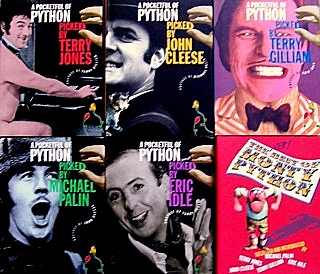
A Pocketful of Python is a series of five books by the Monty Python team, in which each of the surviving members selects their favourite material from the group’s TV series, films, records and books. The first two volumes, by Terry Jones and John Cleese, were released in 1999 as part of the team’s 30th anniversary celebrations. Two further volumes, by Terry Gilliam and Michael Palin, followed in 2000 while the final volume, by Eric Idle, was eventually released in 2002. Each team member’s volume includes a preface written by one of the other Pythons. In 2006 all five volumes were released as a single paperback edition, entitled The Very Best of Monty Python.